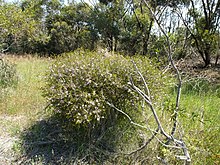| Revision as of 19:27, 9 October 2019 editMy account for October 9, 2019 (talk | contribs)6 editsNo edit summary← Previous edit | Revision as of 19:29, 9 October 2019 edit undoKrj373 (talk | contribs)Extended confirmed users, Pending changes reviewers, Rollbackers3,479 editsm Reverted edits by My account for October 9, 2019 (talk) to last version by Mitch AmesTag: RollbackNext edit → | ||
| Line 10: | Line 10: | ||
| ==Description== | ==Description== | ||
| ''Melaleuca camptoclada'' is a shrub growing to a |
''Melaleuca camptoclada'' is a shrub growing to a height of about {{convert|3|m|ft|sigfig=1|abbr=on}}. Its leaves and branches are ] or almost so. The leaves are {{convert|2.9–5.5|mm|in|sigfig=1|abbr=on}} long and {{convert|1.5–1.8|mm|in|sigfig=1|abbr=on}} wide and elliptical in shape.<ref name="Brophy" /> | ||
| The flowers are mauve and are arranged in heads or spikes to {{convert|16|mm|in|sigfig=1|abbr=on}} in diameter, with 5 to 15 individual flowers. The petals are {{convert|1.5-2.4|mm|in|sigfig=1|abbr=on}} long and fall off as the flowers open. The stamens are arranged in five bundles around the flower with 9 to 16 stamens in each bundle. Flowering occurs from September to November and the fruit are woody ], {{convert|2.5-3.5|mm|in|sigfig=2|abbr=on}} long.<ref name=Brophy>{{cite book|last1=Brophy|first1=Joseph J.|last2=Craven|first2=Lyndley A.|last3=Doran|first3=John C.|title=Melaleucas : their botany, essential oils and uses|date=2013|publisher=Australian Centre for International Agricultural Research|location=Canberra|isbn=9781922137517|page=111}}</ref> | The flowers are mauve and are arranged in heads or spikes to {{convert|16|mm|in|sigfig=1|abbr=on}} in diameter, with 5 to 15 individual flowers. The petals are {{convert|1.5-2.4|mm|in|sigfig=1|abbr=on}} long and fall off as the flowers open. The stamens are arranged in five bundles around the flower with 9 to 16 stamens in each bundle. Flowering occurs from September to November and the fruit are woody ], {{convert|2.5-3.5|mm|in|sigfig=2|abbr=on}} long.<ref name=Brophy>{{cite book|last1=Brophy|first1=Joseph J.|last2=Craven|first2=Lyndley A.|last3=Doran|first3=John C.|title=Melaleucas : their botany, essential oils and uses|date=2013|publisher=Australian Centre for International Agricultural Research|location=Canberra|isbn=9781922137517|page=111}}</ref> | ||
Revision as of 19:29, 9 October 2019
| Melaleuca camptoclada | |
|---|---|

| |
| M. camptoclada in the Stirling Range National Park | |
| Scientific classification | |
| Kingdom: | Plantae |
| Clade: | Tracheophytes |
| Clade: | Angiosperms |
| Clade: | Eudicots |
| Clade: | Rosids |
| Order: | Myrtales |
| Family: | Myrtaceae |
| Genus: | Melaleuca |
| Species: | M. camptoclada |
| Binomial name | |
| Melaleuca camptoclada F.C.Quinn | |
Melaleuca camptoclada is a shrub in the myrtle family, Myrtaceae and is endemic to the south-west of Western Australia. It was first described in 1990 in a review of the genus Melaleuca when the species Melaleuca laxiflora at that time was found to comprise ten species. Two of those species were new - M. camptoclada and M. ctenoides.
Description
Melaleuca camptoclada is a shrub growing to a height of about 3 m (10 ft). Its leaves and branches are glabrous or almost so. The leaves are 2.9–5.5 mm (0.1–0.2 in) long and 1.5–1.8 mm (0.06–0.07 in) wide and elliptical in shape.
The flowers are mauve and are arranged in heads or spikes to 16 mm (0.6 in) in diameter, with 5 to 15 individual flowers. The petals are 1.5–2.4 mm (0.06–0.09 in) long and fall off as the flowers open. The stamens are arranged in five bundles around the flower with 9 to 16 stamens in each bundle. Flowering occurs from September to November and the fruit are woody capsules, 2.5–3.5 mm (0.098–0.14 in) long.


Taxonomy and naming
Melaleuca camptoclada was first formally described in 1990 by F.C.Quinn from a specimen found near the Stirling Ranges. The specific epithet (camptoclada) is from the Greek kamptos meaning "to bend" and κλάδος (kládos) meaning "shoot" or "branch" "in reference to the habit of this species".
Distribution and habitat
This melaleuca occurs in the Esperance Plains, Jarrah Forest and Warren biogeographic regions. It grows in gravelly sand and clay loam.
Conservation
Melaleuca camptoclada is listed as "not threatened" by the Government of Western Australia Department of Parks and Wildlife.
References
- Cowley, KJ; Quinn, FC; Barlow, BA; Craven, LA (1990). "Contributions to a revision of (Myrtaceae): 7–10". Australian Systematic Botany. 3 (2): 165. doi:10.1071/SB9900165. Retrieved 21 March 2015.
- ^ Brophy, Joseph J.; Craven, Lyndley A.; Doran, John C. (2013). Melaleucas : their botany, essential oils and uses. Canberra: Australian Centre for International Agricultural Research. p. 111. ISBN 9781922137517.
- "Melaleuca camptoclada". APNI. Retrieved 21 March 2015.
- ^ Brown, Roland Wilbur (1956). The Composition of Scientific Words. Washington, D.C.: Smithsonian Institution Press.
- ^ "Melaleuca camptoclada". FloraBase. Western Australian Government Department of Biodiversity, Conservation and Attractions.
- Paczkowska, Grazyna; Chapman, Alex R. (2000). The Western Australian flora : a descriptive catalogue. Perth: Wildflower Society of Western Australia. p. 392. ISBN 0646402439.
| Taxon identifiers | |
|---|---|
| Melaleuca camptoclada | |